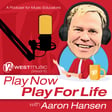
Episode 2: Judy Pine’s Advice for Navigating New Music Classrooms
In this episode, Judy Pine, West Music’s Director of Outside Events and a former music teacher, shares invaluable tips for navigating new music classrooms. From assessing inventory and setting up your space to advocating for resources and maintaining instruments, Judy offers practical advice and insights drawn from her 45 years of experience. Whether you’re a new teacher or starting fresh in a different classroom, this episode is packed with tools to help you create a thriving music program.
To contact Judy for assistance, email jpine@westmusic.com
Find funding resources at https://edufund.westmusic.com/
American Orff-Schulwerk Association (AOSA) website: https://aosa.org/
Organization of American Kodály Educators (OAKE) website: https://www.oake.org/
World Music Drumming website: https://www.worldmusicdrumming.com/
Learn more about this podcast at https://www.westmusic.com/playnowplayforlife
Visit our website for all of your musical needs! https://www.westmusic.com/
Follow us on social media!
YouTube: https://www.youtube.com/c/westmusic
Instagram: www.instagram.com/westmusiccompany
Facebook: www.facebook.com/westmusic
Tiktok: www.tiktok.com/@westmusiccompany
X: www.twitter.com/westmusic
Pinterest: www.pinterest.com/westmusic
